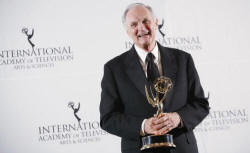Alan Alda's new life lesson is that people need to
connect
 Send a link to a friend
Send a link to a friend
 [July 10, 2018]
By Chris Taylor [July 10, 2018]
By Chris Taylor
NEW YORK (Reuters) - (The writer is a
Reuters contributor. The opinions expressed are his own.)
Based on the years Alan Alda has spent in your living room, you may
think the 82-year-old actor is one of your best friends.
His ability to connect with audiences - since his breakout role as
Hawkeye Pierce on "M*A*S*H" in the 1970s, through countless programs
like "The West Wing" and "30 Rock" - has led to a new career promoting
what Alda believes the world sorely needs.
His company, Alda Communication Training, helps business executives
relate to people with more authenticity, clarity and empathy.
For the latest in Reuters' "Life Lessons" series, Alda chatted about the
wisdom he has taken away from a life lived both onscreen and off.

Q: As a struggling actor, what was the money situation like in the
beginning?
A: I was married when I was 21 and almost immediately had three
children. It was a good nine years or so before I made any kind of
living. There were times I just couldn't afford to drink a can of beer
at dinner – and the cheapest beer was only around $1 for six cans, but I
still had to ration them.
To pay the rent I was a cab driver, I sold mutual funds – mainly to
myself – and I was a doorman. Our first apartment was so tiny that the
kitchen was actually located in a closet.
Q: Was it heartening when you finally started getting some gigs?
A: It was certainly less frustrating. But I had never really considered
doing anything else. It was never about being rich and famous. I only
expected to be able to do what I loved doing, and hopefully make a
living at it.
Q: When M*A*S*H hit, what was it like to deal with extreme success?
A: It was a little disorienting. I had seen my father get famous when he
was in his 30s, and it didn't seem like a terrific thing to be. I was
wary of being famous, because it's really hard to adjust to. If you can
be rich without being famous, I would definitely advise that.
Q: What money mistakes did you make early on?

[to top of second column] |

Actor Alan Alda smiles as he poses with his 40th Anniversary Special
Founders Award at the International Emmy Awards in New York November
19, 2012. REUTERS/Carlo Allegri

A: I was advised to invest in a tax shelter, which turned out to be a huge
mistake because it was a fraud. I got a phone call from a reporter from the New
York Times while I was on set one day, and he said, "So how do you feel about
being in the same boat as Walter Cronkite? You were both defrauded on an
investment."
That was the first I had even heard about it. I was so dazed that I walked
outside and ran right into an iron pole. I lost pretty much everything I had, so
that was a hard lesson.
Q: How has the launch gone for your communications company?
A: What you learn to do as an actor is to really connect to another person. I
realized you could teach regular people to do that, too. So I started a center
for communication science at Stony Brook University, and then a training company
that has worked with thousands of people, mostly scientists and doctors. That
work led to my book, "If I Understood You, Would I Have This Look On My Face?"
and my podcast "Clear+Vivid."
Q: Since you are so interested in science, is that where your philanthropic
dollars go?
A: I work a lot with St. Jude's, a wonderful research hospital that helps
children and doesn't charge families anything. Those efforts are led by my good
friend Marlo Thomas, who has an amazing ability to get things done, raising
something like $1 billion a year for them. Now there is a fantastic communicator
– you have to be good to raise that much money.

Q: What lessons are you passing along to your kids and grandkids?
A: I have three daughters and eight grandkids, and a lot of us have improvised
together. I love that they have an interest in it, because it certainly changed
my life. Improvising is life-changing, because it makes you a different person,
a better person. It puts you in touch with your creativity, and you begin to
trust yourself more, and censor yourself less. Most importantly, you have to
listen to the other person – it's not just about you.
(Editing by Beth Pinsker and Richard Chang)
[© 2018 Thomson Reuters. All rights
reserved.] Copyright 2018 Reuters. All rights reserved. This material may not be published,
broadcast, rewritten or redistributed.
Thompson Reuters is solely responsible for this content. |